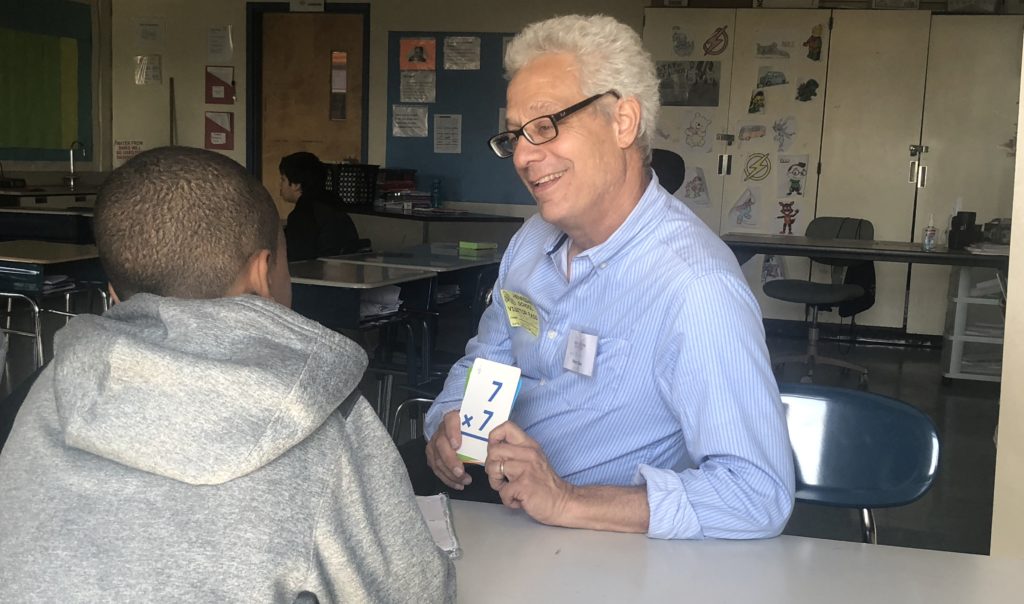
It’s a half hour before Peter Olive is scheduled to meet with the two students he mentors at the Hennigan K-8 School, but he’s arrived early — as he usually does — to provide extra support to their whole classroom beforehand. The students in Kristie McElhaney’s fourth/fifth grade class are convened around literacy board games as Peter sits down to play with a student seated by herself. Periodically, Peter pulls out math flash cards for her and the other students, and they smile as they work out the problems. They’ve seen many of them before.
Peter uses these flash cards to build their basic math skills – ones that need to be refined before the students can progress with the lesson of the day: the placement of decimal points. Ms. McElhaney remarks that these flashcards have really helped to establish the fundamentals that many of her students needed to ensure they don’t fall behind.
Peter’s view on his work with the students is that the benefit is mostly academic.
“The biggest thing that holds them back is that they don’t know their basic multiplication facts. These are things you are supposed to learn in third grade, and have done in fourth grade. Well, these fourth and fifth graders don’t have that. You can’t really learn new concepts, because everything builds on that.“
Ms. McElhaney agrees: “He helps them approach the problem in a step-by-step manner. They feel more confident in solving the problem because they have a way to approach it.”
As the day’s lesson begins, Peter sits with Will and Jaylen, the two students whom he has been mentoring for the past year. The pair are rambunctious and excitable, so part of Peter’s role as a mentor is to ensure that they are hearing today’s lesson and understanding it. Ms. McElhaney’s class is made up of diverse learners who need different kinds of support, so Peter’s students sometimes lack the behavioral skills necessary to succeed in a classroom. In the past, their lack of confidence with the material has made Will and Jaylen hesitant to participate in classroom discussions.
Which is why if you ask Ms. McElhaney, Peter’s impact on Will and Jaylen’s learning is more profound than simply getting them prepared for tougher concepts.
“He’s been very patient in building a relationship with the students. That strong, trusting relationship has helped a lot. A lot of my students have difficulty trusting adults.”
Peter has accomplished this by taking the students’ needs seriously — as a friend rather than as an authoritative figure in the classroom. At times, he has rewarded good behavior by allowing the students to come with him to other parts of the school in order to work on lessons. This special attention has allowed him to build a rapport with Will and Jaylen that has improved their focus over the year. They are not only better able to pay attention and participate with his flash cards, but with the class as a whole.
It’s not surprising to see that Peter’s efforts have resonated so well with students at the Hennigan — he has made a serious commitment to volunteering over the years by going above and beyond to hone his craft. Peter previously made a lasting impression on students while incorporating his science background into mentoring sessions at the Sarah Greenwood School, where his work earned him the Volunteer of the Year Award at our 2017 Academic Mentor Party.
“The first time I tutored it was quite an experience,” says Peter. “It’s very different from the schools I grew up in or that we have in Needham. Just the amount of time that the teachers have to spend on discipline and that sort of thing versus actual learning.”
With Peter’s help, Will and Jaylen have made tremendous progress on their classroom behavior and academic participation, according to their teacher.
“Jaylen was participating in the math lesson about 20% of the time,” by Ms. McElhaney’s estimation. “After a few weeks of tutoring with Mr. Olive, Jaylen was participating about 90% of the time.”
Establishing the basics in a classroom can mean a lot of things, as Peter’s story illustrates. It can mean reinforcing basic math skills, allowing students to tackle more complex ideas. But for many students, it can also mean promoting skills more rudimentary to succeeding in the classroom. Learning how to learn is a processes with which a mentor can often help the most.
